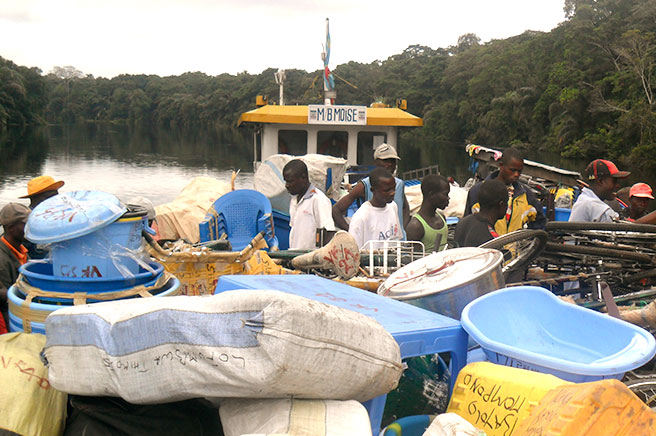Trust, Alternatives and a Boat Called MB MOISE

For conservation to be successful in the Congo landscape, the way in which AWF intervenes requires a lot of thought.
It involves continual investment in sustainable and widespread land-use planning, which seeks to regulate the way communities use land for their different needs. It includes formalizing and codifying forest and wildlife protection measures. It consists of building the capacity of local, provincial and national development organizations. And it necessitates creating economic alternatives that support people’s livelihoods.
Perhaps most importantly, it requires a lot of trust—because though people’s lives are changing for the better, change can be a scary thing.
Valuable Business Commodity
An article published on Forbes online on June 20, 2013, states that trust is the most valuable business commodity.
In the Democratic Republic of the Congo (DRC), AWF’s conservation enterprise team is no stranger to that truth. The team works with communities to implement livelihood and economic opportunities, such as sustainable agriculture, livestock rearing or crafts. These initiatives help raise community members out of poverty and open doors to improved health, education and a more just society—and in the process prevent communities from falling back on the forest for their primary needs. One such example is AWF’s Congo Shipping Project. Since being initiated in 2011, it has become an increasing success—if you agree that success can be defined as a growing customer base as well as increasing customer, partner and employee satisfaction.
“Before AWF’s boat, we worked with other partners. But there were always difficulties,” says Papa Andre, who manages one of the three barges that AWF’s boat, MB Moise, tugs. “When we worked with other partners, we had problems with merchandise being stolen at night. Now, with AWF, things are different. Management is clear. There is transparency. Relations are good.”
Deficient Transportation System
DRC in many ways is analogous to Mark Twain’s literary accounts of adventures on the Mississippi River. Communities in the landscape are on the edge of society, marginalized mainly because they are poor in a country that still carries the stigma of war a decade later. It’s a rustic life in these isolated parts—not exactly horse and cart, but labor is manual, and machines, something out of science fiction and fantasy.
The country is also handicapped by a deficient internal transportation system that prevents goods from getting to markets. Mamas and papas who participate in AWF’s sustainable agriculture projects transport their produce—usually maize or palm oil—by bicycle or by foot along trails weaving through the rainforest. They travel up to 30 km to get to an AWF-rehabilitated warehouse on the riverfront, sometimes only one sack or jerry can at a time (which means they have to make several runs over several days).
AWF’s boat, MB Moise, is helping with the second part of that difficult journey to market, however. Year after year, this white-and-yellow, 250-horsepower tugboat (which was supplied by the U.S. Agency for International Development), takes on Africa's most powerful river. When MB Moise left Kinshasa late September 2015, she carried approximately 600 tons of finished goods into the landscape: extra-large cooking pots, bicycles and more.
Hands-on Learning Experience
Trust implies reaching a common ground. But in the Congo, the challenges are still immense for both communities and AWF. Conservation, after all, is not always easy to understand. That’s why alternative activities to strengthen communities’ commitment to conservation work so well.
Conservation needs to take place through people, and alternative activities are a form of experiential learning where participants learn reflectively from experience. Last year, AWF and agricultural partner IITA supported 150 farmer organizations in agricultural trials and seed multiplication activities. Some 8,800 kgs of maize, rice, groundnuts and cassava were distributed to 5,640 farmers to plant a total of 377 hectares. In December, upon her return to Kinshasa from the landscape, the MB Moise carried 510 tons of agricultural produce—clear evidence of that experiential learning in practice.
And as people learn, they learn to trust one another—a brother or a sister, a neighbor, a project manager… even an international conservation NGO.